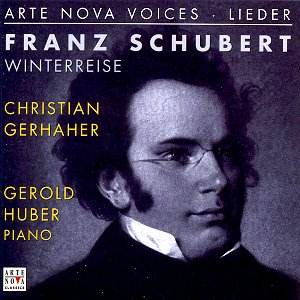This is a good, but certainly not great, Winterreise.
The super-budget market has pulled its socks up since its early days
and Gerhaher and Huber provide a moving, if not life-changing reading.
There are, indeed, various points at which I prefer this duo to Olaf
Bär and Geoffrey Parsonsí thinly recorded 1988 version, recently
reissued on EMIís budget Double Forte label on CZS5 74855-2 and coupled
with Die schöne Müllerin.
Gerhaber has a rounded voice (entirely suited to world-weariness)
and is intelligent throughout. He has a sense of the dramatic and can
summon up a wide range of emotions from thinly-veiled desperation (Die
Wetterfahne) to physical tiredness (Rast), intense sadness
(Das Wirtshaus) and tenderness (Der Lindenbaum).
His attentive accompanist, Gerold Huber, is, if anything,
even more attuned to Schubertís journeyman. A list of his achievements
and insights would be a very long one. Try his carefully-weighted accompaniment
to Gerforne Tränen, or his sensitive handling of tremolandi
in Einsamkeit (which can so easily seem melodramatic in the wrong
pair of hands).
Interpretatively, there are some question marks. Although
Die Post is better than Bär/Parsons by far, it is slightly
under-tempo (it still retains its infectious rhythmic impetus, though).
Der stürmische Morgen, whilst conveying the idea, is hardly
gale-force. The acid test, the final song Der Leiermann is blessed
with a good hurdy-gurdy from Huber but fails in the final analysis to
move the listener in the way that the scoreís greatest interpreters
can. To really move to the heart of this music, one has to reacquaint
oneself with the likes of Fischer-Dieskau and Moore in 1971 (DG 415
187-2), the slow and bleakly presented Schreier and Richter on Philips
442 360-2 or the black-voiced Hotter and Mooreís unforgettable 1955
version (EMI Great Recordings of the Century CDM5 66985-2).
Colin Clarke


